#I hope my point makes sense
Text
“remember when the rainbow was an innocent symbol 😡😡” karen you have green carnations in your yard. you stop and smell violets. you listen to freddie mercury sing love songs. you saw the matrix in theaters. your favorite barista is trans. your favorite actor probably has a husband. you come in contact with queerness every day of your life, and it’s innocuous. queerness isn’t inherently sexual, and neither is the rainbow; you impressed that “impurity” upon us.
#got a bit political at 5am yall oops#terfs don’t even think about getting near this one#inspired by the Instagram comment section#lgtbqia+#lgbtqia#I hope my point makes sense#queer community
47 notes
·
View notes
Text
There's an aspect of Original!Elias Bouchard that makes me so sad to think about in a weird kind of "meta" way.
And that's the fact that he has to be labelled as the "OG" not as Elias.
Technically speaking Elias has been dead for years. It's Jonah that's taken over - literally having his eyes removed and replacing them with his own and living as him (he even seemingly keeps his "old fashioned haircut" on Elias' hair).
And yet we as the audience don't often call that form of Jonah "JONAH". Instead it's Elias, cause he's been Elias for 4 series at this point.
"Elias started the apocalypse", "Elias beat that old man to death with a metal pipe" when it was never really Elias in the first place.
He's been so robbed of his own identity that not even death can spare him; all of Jonah's actions in his body are recognised as him.
(Btw this isn't me saying you can't call Jonah!Elias straight up Elias, I do that regularly ofc. I'm just being emo rn lol)
#I'm tired out of my mind so i hope this makes sense lol#og!elias was such a dick but he does make me very sad#any legacy or reputation he could have had positive or negative is taken away by force and tarnished by Jonah#og!elias#og!elias bouchard#elias bouchard#original elias bouchard#jonah magnus#the magnus archives#tma#tma spoilers#?#idk at what point that tag can be dropped lol
764 notes
·
View notes
Text
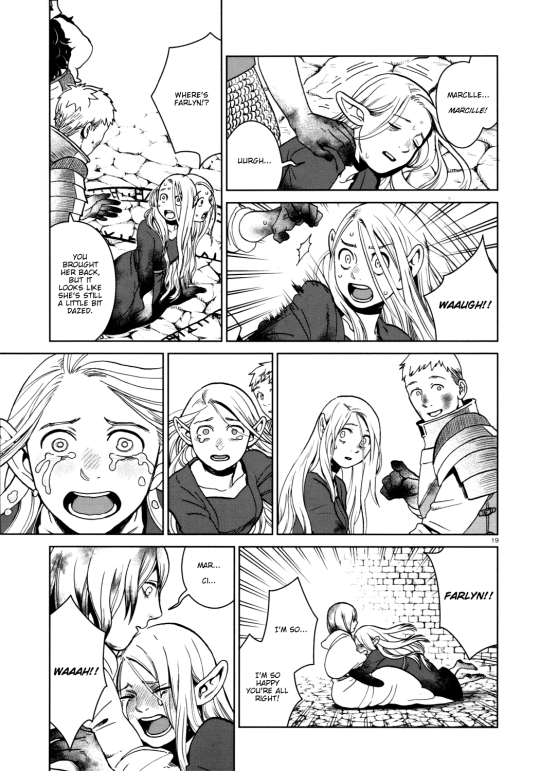
To be completely honest I still prefer the original manga Farcille reunion over the anime scene. I think Trigger did a good job adapting this page, but no one draws Marcille bawling her eyes out as well as Ryoko Kui, it just gets to me. Just look at her face... She missed Falin so much! She almost looks like a child crying..
#hope this makes sense its very late here so my english might be muddled rn but my point is manga crybaby marcille > anime crybaby marcille#i cant stop thinking about them and its 4am!!!! farcille brainworms is a disease#dungeon meshi#farcille#marcille#falin#valkaryah.txt
2K notes
·
View notes
Text
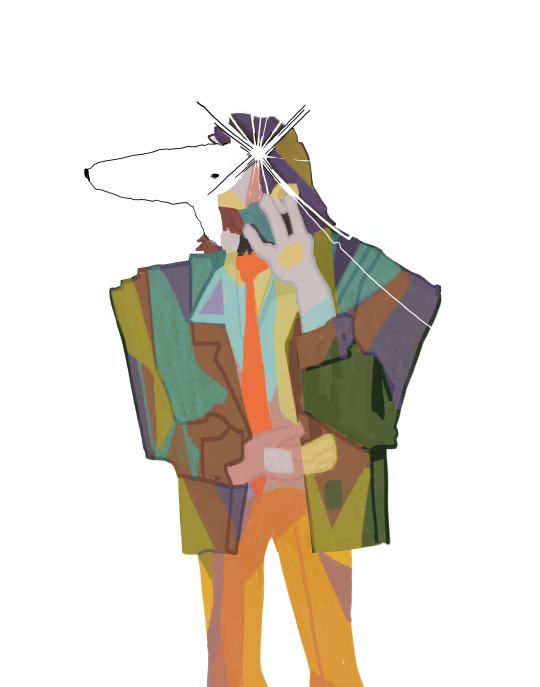
this bad boy can fit so much sick symbolisms
#disco elysium#harry du bois#hey guys lil doodle cause i got my pen display back and also as proof of life and also im obbsessed with this game!#also it was about time i posted totally indesheirble art that only makes sense to me :)#cause casue he dosent wanna be this kind of animal and theres a HOLE in his head and and#also testing some new brushes so thats fun#anyhow uh yeah hope noone minds soem very unfinsiehd art!!!#song of todaayy isssss noootttt this is why by paramour#it is instead woke up new by the mountain goats which a friend pointed out is a great pre game harry song#spins him around#:))#my art
1K notes
·
View notes
Text
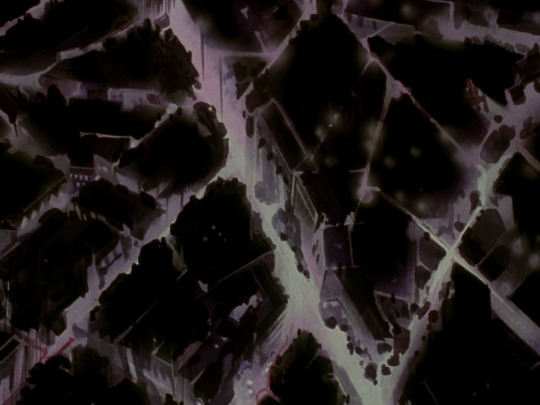

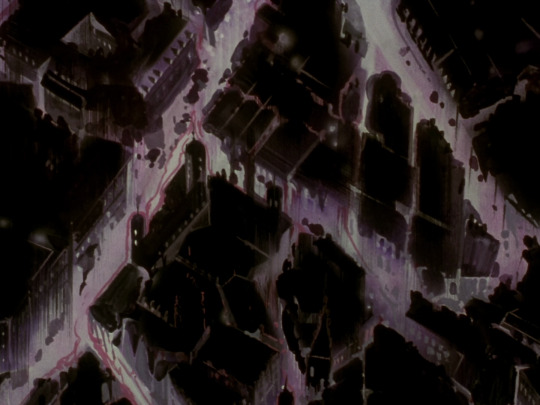
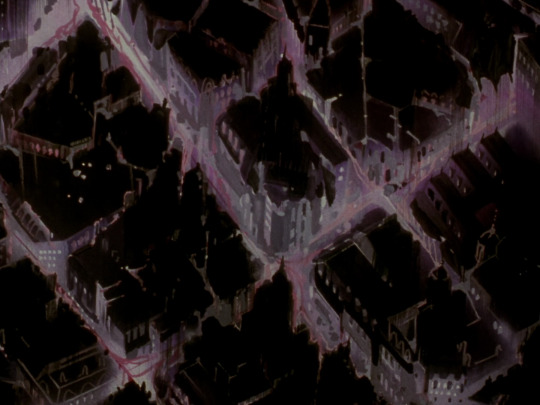
these aerial shots of the streets in the scene where anthy was about to jump off a building in episode 37 remind me of a network of blood capillaries gradually flowing with some foreign substance (the way the red lines were drawn certainly resembles some liquid substance). the camera panned towards anthy from the 1st to 4th picture, and the streets gradually turned from pure white to white with some red.
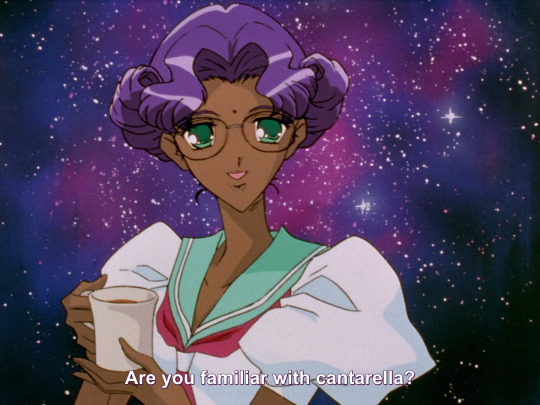
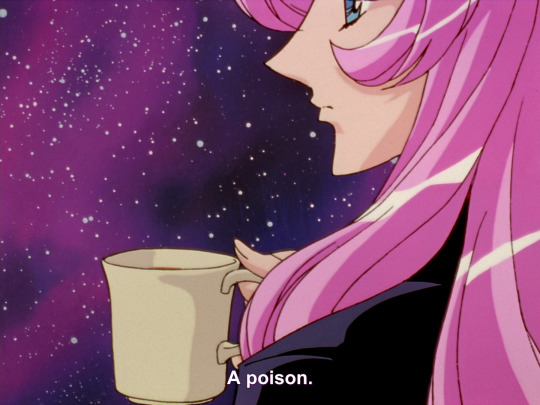
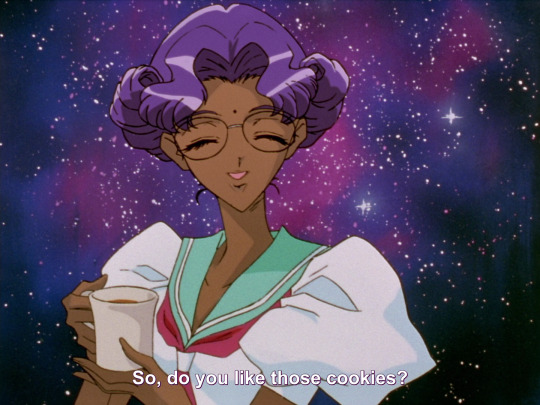
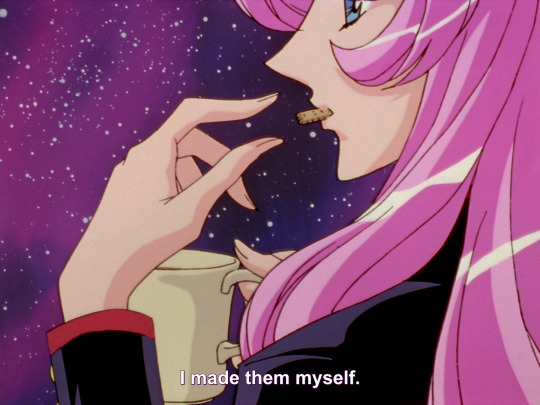
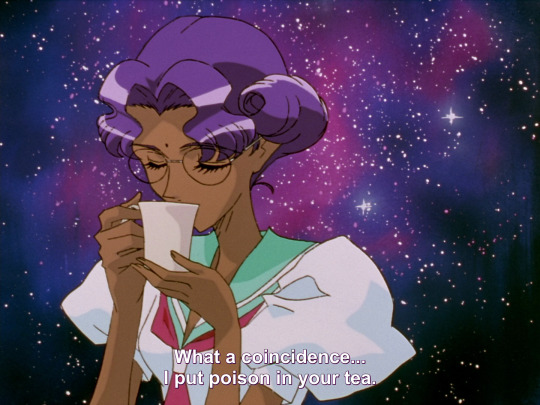
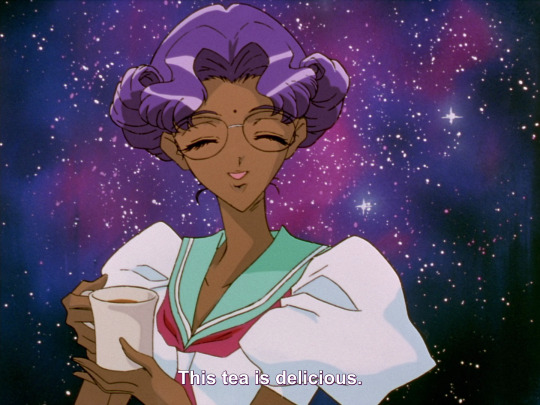
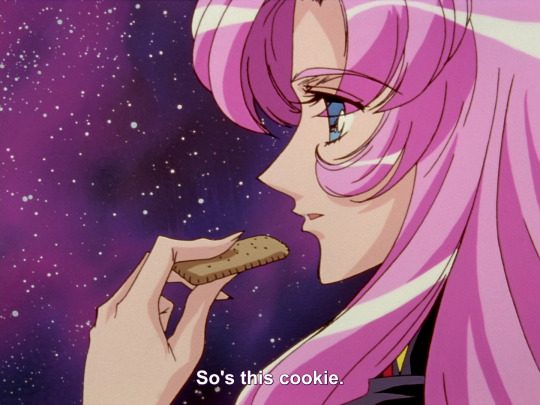
before the suicide scene, utena and anthy were enjoying tea and cookies at akio's place, and they were wearing their school uniforms. anthy indirectly hinted at "poisoning" the cookies. in response, utena directly stated that she had "poisoned" anthy's tea. both accepted the poison into their systems (bodies) without any hesitation or qualms. noticeably, in this scene, utena didn't wear the rose crest ring that she took off at the beginning of the episode. i'd like to think of the streets gradually turning from white to flowing with red liquid as the visualisation of the poison they consumed in this scene gradually circulating in the system (via blood vessels and capillaries); thus, these points represented utena and anthy's bond/relationship with each other up until before the suicide attempt (white) and after (flowing with red).


up to at least the moment utena found out about anthy and akio at the end of episode 36, utena and anthy hadn't been honest with each other, despite utena saying to anthy that she could come to her if anthy had any problems, and that they can help each other through anything (episode 25). from the point akio began making bold moves in grooming utena (episode 30 onwards), which led to sexual assaults and rape, utena had started to keep things out of anthy's knowledge/unable to tell certain things to anthy.
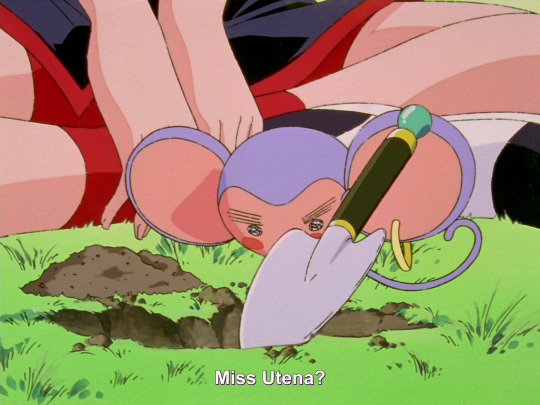
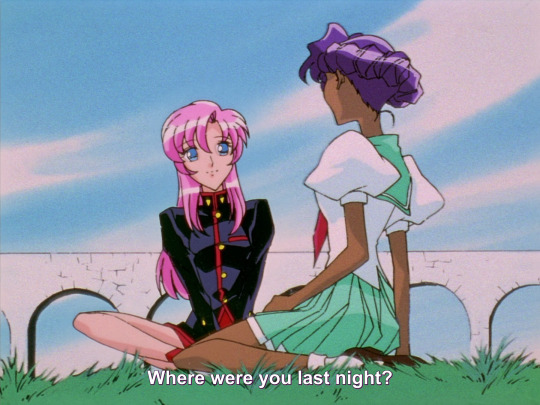
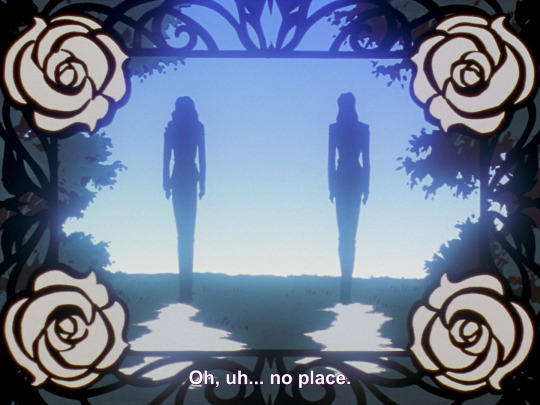
a prominent example of this would be the scene in episode 36 where anthy asked about utena's whereabouts the night utena went to the dueling arena with touga. other examples are in episodes 30 and 35. anthy, on the other hand, hadn't been honest with utena from the very beginning. from my understanding, from both sides, the dishonesty with each other came from the dire need to preserve the sanctity/purity of their bond (and the despairing inability to open up about respective sufferings). both utena and anthy didn't wish to taint their bond with their ugly stories of truths. the situation was more adverse for anthy because letting utena know the truth could derail all of akio's plans.
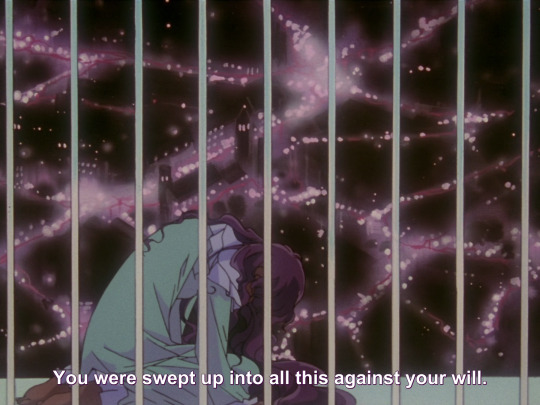
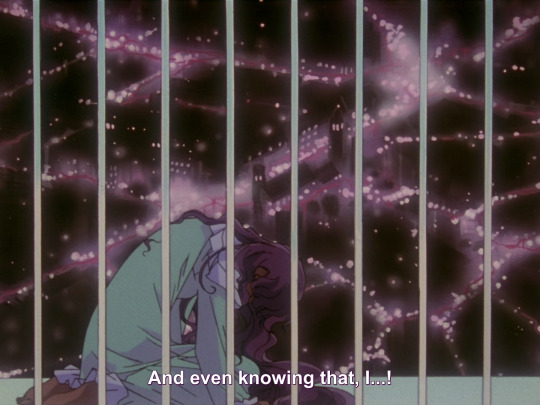
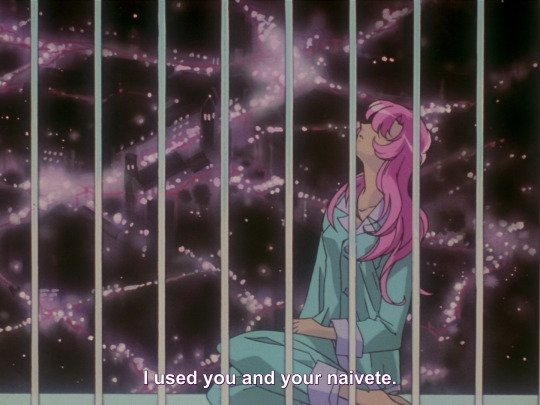
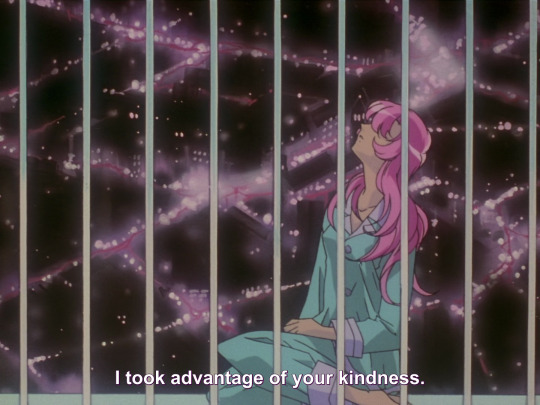
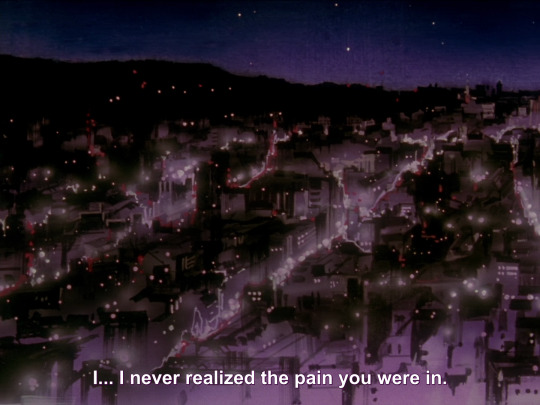
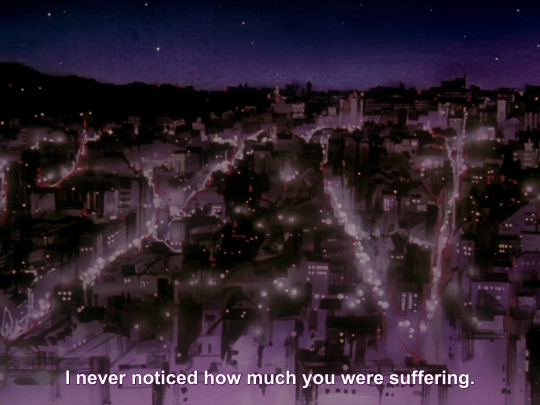
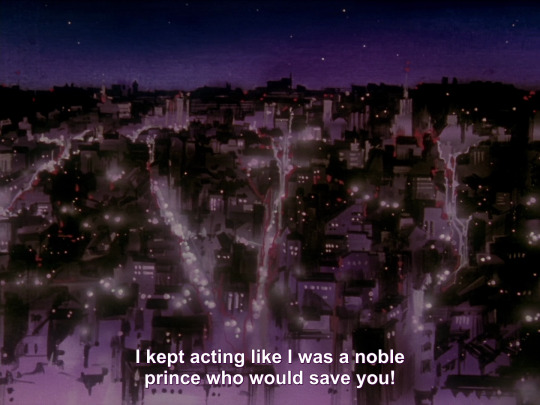
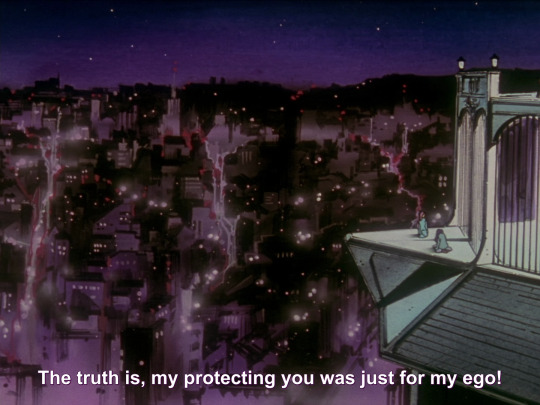
(note the network of streets) with regard to the series, colour theories were ever-present in every visual aspect. white was equated to purity and innocence; red was synonymous with violence and danger. i think these meanings suited the visuals of the post-suicide attempt scene, the purity of their bond was incrementally coloured with violent truths from one another. moreover, i also think the post-suicide attempt scene further reified the cantarella scene. in other words, the post-suicide attempt scene was the more literal take/depiction/iteration of the cantarella scene (if that makes sense), with the visuals of the white streets flowing with red as the connecting factor between the two scenes.
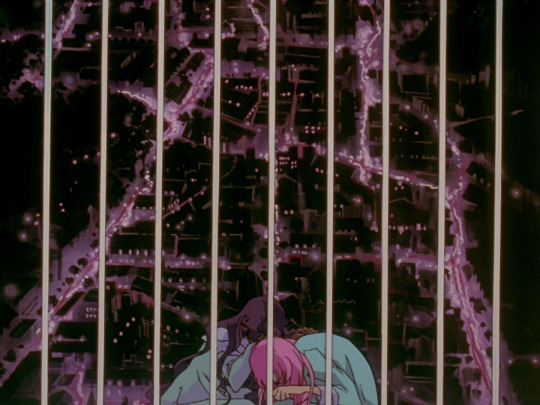
the final visual of the "poisoned streets" before anthy urged utena to leave the school. the poison was freely and fully flowing through every street. throughout the suicide scene, utena and anthy were both in their sleepwear. this may connote a more vulnerable and honest disposition without any facade, as well as a better understanding and more equal footing with one another, compared to when they were in school uniforms during the cantarella scene. utena was also wearing her ring here, which may highlight her choice to play the role of a prince for anthy's sake to the end.
in addition, i think the streets flowing with poison could also be seen as a network of empty/dried blood capillaries finally flowing with blood; akin to a dead body coming back to life. after a person dies, the first visible change would be pallor mortis (within 15 to 20 minutes), wherein the body begins to pale because blood stops moving through the capillaries. with regard to this information, the visuals may indicate a sign of rejuvenation of the bond between utena and anthy after opening up to one another. the bond between them became more human, alive (flowing with blood), as opposed to being hollow (dried out blood capillaries; like death). to me, i believe both interpretations could work simultaneously for the visuals of the streets.
#i really hope these make sense#these are just my point of view#i could be wrong#revolutionary girl utena#shojo kakumei utena#shoujo kakumei utena#rgu#sku#utena tenjou#anthy himemiya#utenanthy#akio ohtori#analysis#medical knowledge finally came in handy!#i tried making gifs/videos of the streets for better clarity but tumblr is Very Picky and i'm not skilled#✮
328 notes
·
View notes
Text
thinking about isat. I feel like this game talks about relationships in a way that is so refreshingly honest.
There’s something so not quite perfect about the resolutions and conclusions. I can’t think of as many examples to point to off the top of my head but, the specific moment that comes to mind is Siffrin and Bonnie’s talk about Siffrin’s physical boundaries. How they work through it but Bonnie still doesn’t exactly get it, because it’s a very complex situation, because they’re young. And Siffrin still has some feelings about how Bonnie approaches them, because they’re very headstrong and quick to act even when they’re earnestly trying. But they’re trying, and they’re making progress, and that’s the important part that comes out of it.
I think that’s really what makes isat’s conclusions to some of its character vs character(s) conflicts hit for me in a way some others don’t. The resolution doesnt mean that things are immediately improved, necessarily. But there is a promise in the actions and conversations. There’s an implication that these things being addressed are things that the characters are going to keep working on even as the game comes to an end.
Even Isabeau and Siffrin finally getting their confession, although not necessarily having the same tone as Siffrin working on his boundaries or communication, is still a “let me think about it.” It’s still not giving you a solid answer. There’s no capstone that says exactly where they stand now. Relationships are and will always be malleable. Although stories have a set beginning and a set ending, real people, their relationships, their conflicts, will forever be in flux.
something along the lines of, just because isat is a narrative with a beginning and end, it doesn’t mean the relationships and their conflicts and progress are as set in stone as the ending of a story. You will, ideally, always be communicating with people. You will, less ideally, continue to have conflict, and times you feel like a conversation could have gone better, and the thought that you’ll probably have to come back to the topic again sometime. And isat delivers its relationship storylines in a way that acknowledges that, I think.
#In stars and time#I’m getting very excitable about the complexities of relationships tonight.#I can’t tell if this makes sense but I hope at least a sliver of my point is visible in here somewhere.#Text posts :0]#isat spoilers
182 notes
·
View notes
Text
csp mini guide: edge eraser!
@lunasun hihi!! i tried to make an visual and wrote an explanation
i hope this makes sense but if not then i failed LOL
i hope you don't mind the tag
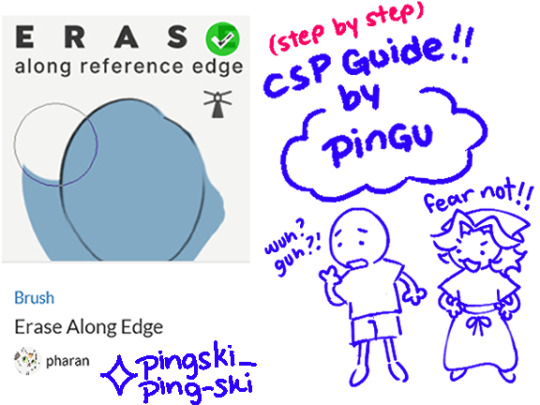

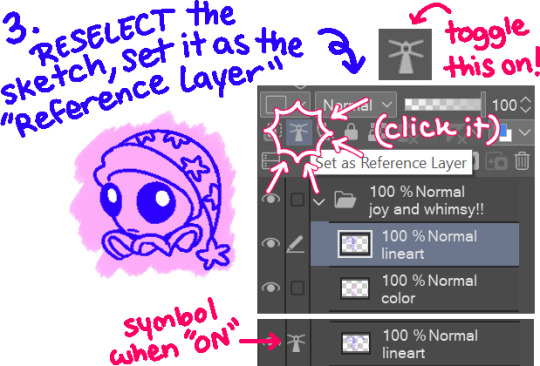
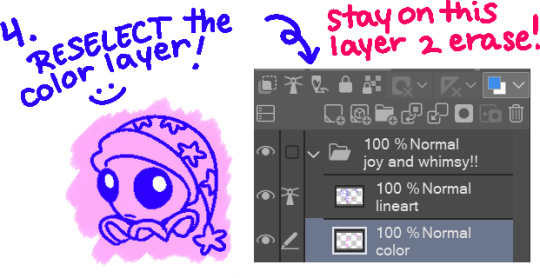

Erase Along Edge (Edge Eraser) text version!
1. Sketch or line as normal on one layer.
2. On a separate layer, below the lineart, color as normal.
3. Return to the lineart layer, and set it as the "Reference Layer". (Toggle ON by clicking on the lighthouse icon!)
4. Return to the color layer, select the "Erase Along Edge" tool, and erase the offending overlap! Aaand then you're done!
Try stick to the outside of your lineart to avoid accidently erasing what's inside. As long as your brush size is reasonable, it shouldn't erase what's inside too much or at all unless if your cursor is inside of the lineart!
Quick Troubleshoot
"It won't erase properly?"
"My lines aren't opaque and/or is too messy."
That's OK!!
While I do recommend solid lines (few gaps or none) or opaque lines (at 100% opacity), it's NOT necessary! It just makes using the tool easier! Most of the time you can get away with it, so don't worry about having to change your style or anything.
If the lines are not solid (have gaps) or aren't opaque (lower than 100% opacity), please refer to the tool properties/settings! You may need to experiment here.
Adjust the "Tolerance" and "Area Scaling" settings and repeat the process until you reach your desired result!
Please note: If lines intercept (creating small "pockets) or opacity is still an issue you may have to manually erase anyways (sorry lol). By all means, it isn't perfect BUT it is a BIIIGG time saver once you have it down!
The creator (pharan) makes more specific points and fixes in their guide that is far more in depth! I just want this to be easy to understand for anyone who's never used it before or is trying it for the first time! :)
#clip studio paint#csp ex#csp pro#fnaf daycare attendant#dca fandom#moondrop#pingdoobles#god i HOPE this makes sense#please tell me if it doesn't!!!#im not used to making guides or anything and i DO NOT claim to be a professional#im also happy to answer more questions or help further explain if there's still confusion!#ok i need to sleep i have to work and it's almost 6am awkughaw#will make a 2nd guide on the lasso fill tool “ice cream man” thing sometime l8r#idk when later is but at some point#my eyes are drooping while i type god#i am the eeper gn!! (or gm??)
156 notes
·
View notes
Text
Killua and the Power of Wishes
Okay going to try and make this coherent because the amount of wish association all through Killua's character development makes me want to chew plaster.
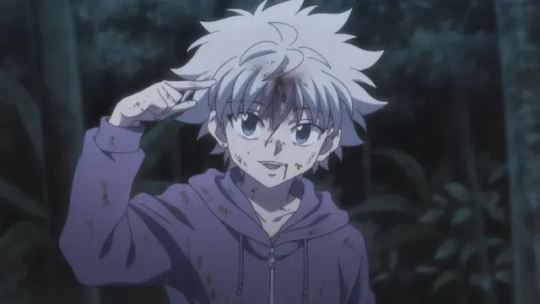
As a fair warning, this analysis ended up being long as hell, and I didn't even include everything I could've said. This is also just one lens to analyze Killua's story arc with, and I feel there are other valid interpretations of some of these moments. This is just one of mine, so keep that in mind please.
One last warning that this analysis does discuss emotional manipulation and abuse, as is par for Killua's background.
Let's set the stage with one important piece of info: Killua's birthday.
Killua's birthday is July 7th, the same day as Tanabata. Tanabata is a folklore-rich festival where according to legend, the two lovers, weaver Orihime and cowherd Hikoboshi, represented by the two stars, Vega and Altair, are allowed to reunite once a year after separation. A popular custom of Tanabata is to make wishes by writing them down on tanzaku, then hang it on a bamboo tree so that the wish might one day come true.
Tanabata is also known as the Star Festival. Please keep this in mind, because I'm going to come back to it.
To finish setting up the lens for this analysis, I'm going to need to dig into the game-changer scene for Killua's early characterization - his confrontation with Illumi at the end of the Hunter Exam, and specifically, the exact nature of Illumi's manipulation of him.
I say "game-changer" because it really is - up until this point, it's kind of fair to not fully know what to think about Killua. Certainly, he seems excited to hang out with Gon (he approached him first, after all) and he's friendly enough, but he's also arrogant and claims to be motivated mainly by boredom. For all intents and purposes, Killua seems set up to be Gon's dangerous yet charismatic rival... but then this scene happens and it completely turns it all on its head.
Because Killua may have mentioned his family was controlling before, but he seriously downplayed the severity of it - likely because he has no point of reference for how awful his situation actually is other than it makes him feel bad and trapped. Illumi's appearance immediately shifts our understanding of Killua from runaway murder kid with annoying murder family to straight-up victim of emotional abuse, and dissolves his cockiness instantly to terror.
What does all this have to do with wishes? Glad you asked. Let's look at some of Illumi's dialogue.
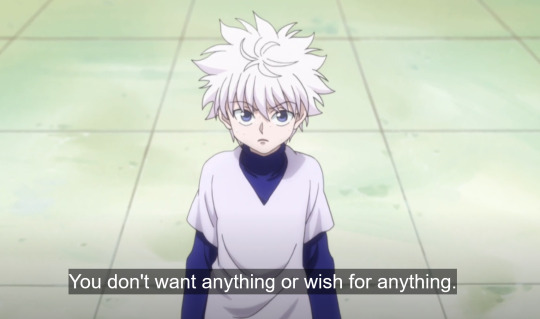
[ID: A screenshot from HxH episode 20 of the 2011 anime. Killua looks up, sweating and conflicted, as Illumi tells him "You don't want anything or wish for anything." End ID.]
This is the crux of Illumi's (and the family's) control. Killua's desires do not align with the family trade. They must be excised from him.
When Killua insists that he does have something that he really wants, Illumi says "Tell me what it is you want", in a mockery of a certain other sibling who would have helped fulfill this wish - Illumi asks only so he can completely dismantle it. And Killua isn't even really surprised at Illumi's words, just heartbroken. You can tell this isn't the first time this sort of thing has happened.
Killua states his wish quite fervently; he really means it. But his words are not rebellious, nor cathartic. Instead, he answers Illumi quietly, as if fearful or ashamed, almost reminiscent of a sinner's confession.
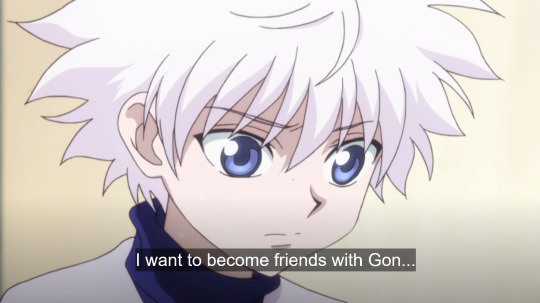

[ID: Two screenshots from HxH episode 20 of the 2011 anime. In the first Killua looks down with a troubled expression, saying "I want to become friends with Gon...". In the second, his face is hidden as he stands with hands clenched at his sides with a spotlight on him. He says "I'm sick of killing people..." End ID.]
It's such an innocent, simple want.
And Illumi proceeds to make him feel like even something so simple is harmful and selfish of him... not to the family, but to Gon.
In a matter of a few minutes, Illumi breaks down Killua's wish by:
Acknowledging this desire, but twisting it into something that will inevitably fade over time, thereby causing Killua to doubt his own conviction and feelings -> "Gon is a novelty, a radiant presence who has piqued your curiosity. No more than that."
Acknowledging that Gon is someone important to Killua, and undermining this by telling him that by his very nature, he will eventually bring harm to Gon, which makes him feel as though Killua cannot trust himself to be a good friend -> "If you try to be friends with him, you will one day want to kill him... because you are, by nature, a murderer." (As a... delightful... bonus, this is also apparently how Silva and Illumi justify their treatment of Killua to him - "This is the essence of your existence and we taught you accordingly." Like they adapted to Killua's nature, instead of them molding Killua into who they wanted him to be.)
Delivering an ultimatum - to fight Illumi and win, or else Gon will die - that Killua is doomed to fail due to his upbringing and the needle in his head. Since Killua doesn't know about the needle, he assumes this is his own personal failure, something Illumi feeds into -> "You're just not qualified to make friends."
And it's the last point that breaks him. The first two shoot down Killua's present wish, but the last proceeds to shatter any hope he might've had of wishing for anything similar in the future - he has told him that his desires are weak, temporary, inherently dangerous to those around him, and worst of all, aren't enough on their own for him to deserve friendship and love from others. And the clincher: Killua feels like all of this is his own fault, that there is something inherently dangerous and wrong with him!
So, it doesn't even matter to Killua anymore if he fails the Hunter Exam. To him, he just failed the only test that mattered.
10/10 manipulation, Illumi. Fuck you, seriously.
Killua's character arc is mainly his quest and struggle to refute Illumi's arguments and to shake off the manipulation and the ways in which his family have molded and controlled him. And by far, the most difficult part of his conditioning to shake off is this idea that he is undeserving of anything more than what he is already given.
It's almost like the family has drilled it into him that wishes are dangerous. How interesting.
Thankfully, however, there are two parties to Killua's wish here - Gon, too, is a part of it, and it is not simply his reciprocated desire to be Killua's friend that saves him, but also his recognition of Killua's situation for what it is (notably, when no one else correctly identified the true issue).
"You know it wasn't his choice. You manipulated him, kidnapping his spirit!"
The ensuing Zoldyck family arc emphasizes that Gon is 100% correct: the main hold Killua's family has on him isn't physical - it's all emotional.
Killua breaks one of his shackles when Milluki threatens to have his new friends killed, but he only breaks the rest when Zeno tells him he's free to go. So, if Killua could break loose at any point, was this still a rescue like Gon said?
Well, yes - just because he absolutely could've broken out physically at any time, that does not mean he could just leave. That's the nature of situations such as this - it's not as simple as "just leaving". Support is necessary, as is actually having something tangible outside the situation to go to - otherwise there is little point to leaving at all. Gon (and Kurapika and Leorio) showing up to free Killua showed him that his wish was reciprocated and allowed him to break one cuff - this is the start of his journey, but he still has a long ways to go. Notably, he again hesitates and closes off when Silva asks what he wants.


[ID: Three panels from HxH chapter 42. In the first, Silva asks Killua "...would you like to see [Gon]?" Killua's expression is complicated in the next panel - he's closed off and uncertain. Silva continues "Be honest, Kil... what do you want?" End ID.]
Killua will backtalk and casually break his shackles and death glare his family... but he's too fearful to voice his wants aloud.
And once again, asked by his father what he wants, he is subtly set up to fail. His wish is granted, but made conditional - "Do not betray your friends", something Killua is regrettably set up to do by virtue of the needle in his head that he, again, doesn't know about. Silva fully expects him to fail and come back home, disillusioned, believing it's his own fault due to his "nature", and trusting in Silva still as a "reasonable" figure in his life.
This condition placed on his friendship is what drives much of Killua's fear and insecurity with regards to Gon for much of the series - the idea that Killua has to earn his right to friendship, and that if he doesn't, he will lose it, one way or another.
It really makes me wish that Killua had actually gotten to hear Gon's views on friendship from the beginning of the Zoldyck Family arc, because it entirely refutes this entire philosophy. He even outright refuses to go through the Testing Gates at first, purely because he thinks the sentiment of needing to prove yourself just to be friends is completely outrageous - he only relents because there is no other way.


[ID: Two screenshots from episodes 21 and 22 of the 2011 HxH anime adaptation. Gon looks up at Illumi and firmly states "[Killua] doesn't need to earn the right to be my friend!" In the second, Gon's face is seen in profile and close up as he asks "Why would you test your friends?" End ID.]
I doubt it would've truly prevented Killua's insecurity from manifesting even if he had heard this, to be honest - his issues with usefulness are very deep-rooted in his upbringing - but still, it would've been nice for him to hear, I think.
However, that's not to say that this exact sentiment doesn't come through in their interactions.
Gon, as Killua's friend, cares about what Killua actually wants and wants to make sure Killua knows that - and that's part of what makes the Whale Island conversation between them really important.
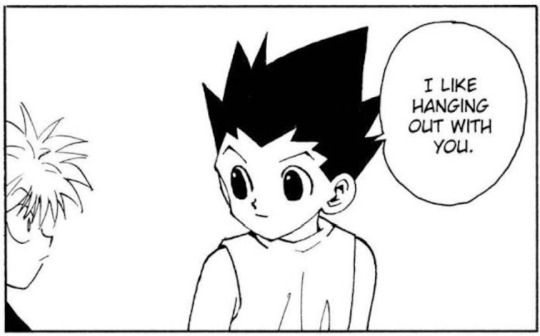

[ID: Two images, both of the same scene from HxH chapter 64, and episode 37 of the 2011 anime. In the manga panel, Gon has turned his head to look at Killua directly, who looks shocked and taken aback, to say "I like hanging out with you." In the anime screenshot, Gon has turned his whole body to face Killua, and says "I think it's fun to be with you." End ID.]
I see a lot of people chalk this up to just Gon being Gon, but it reads to me as much more deliberate than even his usual honesty. He's turned so he's looking directly at Killua, which is a sure way to make his words come across clearly. The lead up to this is Killua, again, not knowing or being able to vocalize what he wants. He doesn't have a goal to work towards like Gon, he only knows what he doesn't want - he's a mix of envious and admiring towards Gon, who knows what he wants and simply goes for it.
But this conversation makes it clear that they have a shared wish - they both want to be friends, and they'd both like to stay together. It's not about earning, to Gon, it's only about if they both want the same thing - mutual, not conditional. There's a nice almost call-and-response type dialogue here, where Gon asserts that he likes spending time with Killua (very directly lol), then shares that Killua is the first friend his age he's had. This prompts Killua to say that Gon is his first friend ever, and that he does have fun with him. And just like that, Gon replies "Then let's stay together!" and pointedly includes Killua's desire to find a goal in their, now shared, upcoming journey.
Overhead, a shooting star appears in the sky. A mutual wish is granted.

[ID: A panel from HxH chapter 64. The night sky is full of stars. In the centre is a shooting star. End ID.]
Hm. Stars. Remember how I told you to keep that in mind, all the way back at the beginning? Their association with Tanabata, making a wish on a shooting star, etc. etc.?
Well, buckle up because this star is going to make you experience so much sadness now.
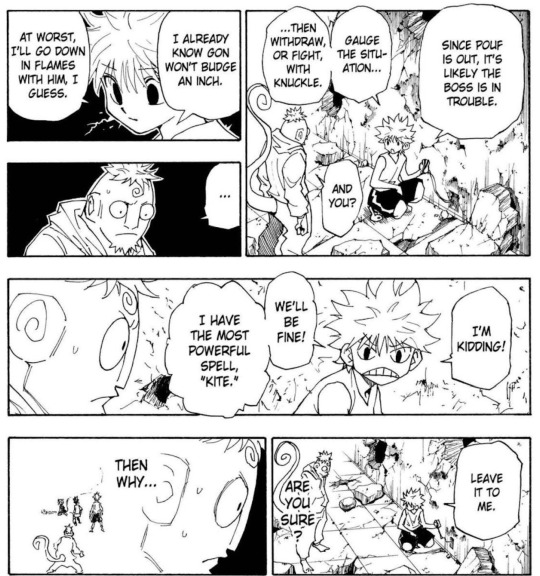
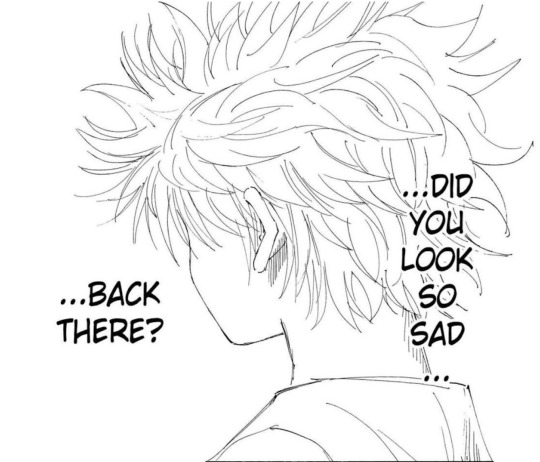

[ID: Panels from HxH chapter 286. The first is a conversation between Killua and Meleoron where Killua asserts he intends to "go down in flames with [Gon]". When Meleoron looks concerned, Killua brushes off the declaration as a joke. In the second image, Killua is turned away, his outline pale, as Meleoron thinks "Why... did you looks so sad... back there?" The last image is a cloudy night sky filled with stars. At the centre of the panel is a shooting star. End ID.]
Yeah, it makes its reappearance directly after Killua has "jokingly" resolved to die with Gon if it comes down to it, after "since it means nothing to you".
I am assured, in Japanese, the word choice here is 心中 (shinjuu), the word for double suicide, where the intent is to die at the same time in the same manner in order to be reunited in the afterlife. The implication here is that Killua, having increasingly grown insecure in his place by Gon's side but unable to voice this, knowing that Gon is hurtling down the path of no return, thinks back to their conversation under the stars where they both mutually wished to stay together and, because he believes that it is no longer possible for him to help Gon, has resolved to stay by his side in death, and after it.
...holy shit, kid.
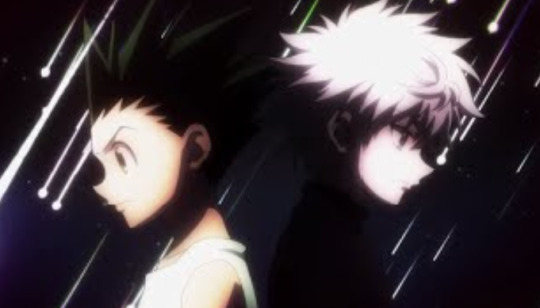

[ID: Two screenshots from the 4th ending of the 2011 anime. In the first, Gon and Killua stand back to back as meteors fall around them. In the second, they stand facing away from the audience towards a body of water under a night sky filled with stars - Gon throws a stone, which flashes in the air like a shooting star. End ID.]
And of course, here's the shooting star again in the 2011 anime's Nagareboshi Kirari ending, as well as it being the subject of the song itself and rather explicitly referencing that wish to go on a journey together, to stay together, because... Madhouse hates us. I guess. :'(
What started off as a simple wish for a friend deepened into a wish to always stay by Gon's side. This is largely good at first! Killua is able to explore and experience genuine friendship, to get a taste for freedom, and use the power of his fervent wish to protect his dear friend in order to rid himself of Illumi's needle. However, the more Killua wants, the more he traps these wishes in monologues within his own head and does not voice them aloud. Part of it is that he already feels he's been given much more than he deserves - seeing himself as a creature of darkness and Gon as light - but a greater part of the issue here is not that Killua is afraid to wish for things, but that he is afraid wishing without "compensation" will inevitably lead to horrible repercussions - namely, losing who he loves.
In order to feel worthy of staying with Gon, of earning his friendship, Killua works hard to help Gon achieve his goals, taking on the role of wish grantor, growing to do practically anything needed to support him for seemingly nothing in return - but that's not 100% true. Killua wants at least some appreciation, whether he admits it or not - it's a security thing, and it also clearly makes him happy, even if he's not great at accepting it. He insists in Chimera Ant arc that friends don't need to thank friends, but this declaration always read as very sudden to me or like a rationalization, and it's relevant to remember that this is at the peak of Gon isolating himself and self-destructing before his eyes, and Killua's own insecurity regarding his importance to him.
Killua might not mind doing things without thanks, but that doesn't mean he doesn't like to hear that Gon appreciates him. He clearly does appreciate verbal confirmation of their bond! We know this.
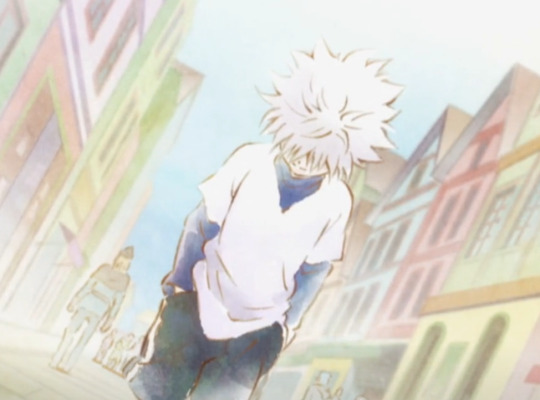

[ID: Two screenshots from the 2011 anime. The first is from episode 61. Killua smiles down at the ground with his hands in his pockets, the colours having gone soft and bright. The second is from episode 70 during the dodgeball match. Gon smiles determinedly in the foreground as Killua looks shocked next to him. End ID.]
Keeping all this in mind, Killua's story, or at least this part of it, couldn't have concluded in a better way than his rescue of Alluka, the wish grantor.
Now, I could probably write an entire other analysis on Alluka and Nanika alone, but for the sake of not making this any longer than I already have, I'm going to go through only a few points. Alluka is incomprehensible to her family because they make no attempt to understand her, with the exception of Killua. The only thing they do seem to understand, when explained to them, is the demands made after Nanika grants a wish - this, of course, fits neatly into their own predetermined views on "earning" and "punishment". However, beyond this, they make no attempt to understand her, and since her power is deemed dangerous and uncontrollable, she is locked away.
They are worried, first and foremost, that Alluka will bring harm to the family, and there's two ways in which this could be true:
As a function of failing to fulfill her requests, of course
Because she, just by existing, threatens the family's status quo
I stated at the beginning that Killua's desires do not align with those of the family business, and he's always apparently been more open to understanding others - he asks Alluka and Nanika questions to understand them, and treats them with respect, while his family are more so focused on subjugating anything that might be a threat. This is what Illumi tried to drill into Killua after all; never fight a superior opponent - everything is about assessments of relative strength, which leaves no room for open-mindedness or getting to know people.
Faced with a daughter who is clearly incomprehensibly powerful, and a son, the would-be inheritor of the family trade, who is showing a disturbing amount of willingness to befriend instead of retreat from her, the family made the decision to excise Alluka not just from where she could "harm" the family power-wise, but also likely to secure their control over Killua, who they then set about practically programming to not have any more wishes for himself, or at least to not be able to vocalize them without fear of loss or retribution.
The family's nickname for Killua is "Kil" or "Killu", which is deeply fascinating to me as a reader - nicknames are expressions of endearment, typically, and I actually don't doubt that here. Killua's family does love him, but their love comes with conditions. He must be molded into the perfect son, and every part of him that doesn't fit must be excised.
So: Killua's memories of Alluka are suppressed with the needle, and she is further cut from his life by dropping the "a" from his name (the Zoldyck children are named like a game of shiratori - Illumi -> Milluki -> Killua -> Alluka -> Kalluto). The nickname is also like a command or order "to kill", which is of course what they want him to do.
Saving Gon through saving Alluka and Nanika forces Killua to have to face down the last and hardest of Illumi's manipulations to shake, and that's the notion that a wish, that kindness and friendship and love, cannot be unconditional without severe repercussions - where the people he cares about get hurt because of him, something he cannot envision being forgiven for.
It's a little sad to me that after spending most of the series struggling against his family's teachings that they didn't lead to Killua betraying Gon at all, as he'd feared... but to him betraying Nanika, by sending her away.
Here is this little girl with a bloodstained past, incredibly powerful and dangerous and capable of amazing feats, treated as some evil thing by those who fear her. But she is kind at heart. Her true strength lies in healing, not killing. And she only takes commands from Killua.
Illumi thinks this is because Killua is the only one with control over her. Killua believes this is because she wants praise. They're both partially correct, but this is not the full reason Nanika does what Killua asks of her.

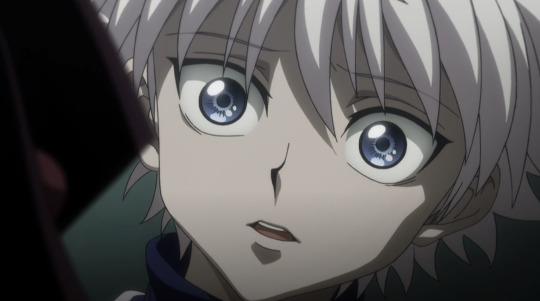
[ID: Two screenshots from episode 146 of the 2011 anime. In the first, Nanika smiles and says "I love Killua." In the second, Killua looks at her, stricken. End ID.]
Nanika loves him. Everyone has been trying to figure out all these complicated rules and conditions on her wish granting and why Killua is the one exception, but the answer is exceedingly simple. She loves him, and wants to do nice things for him so he can have his wishes granted. It's the only way she knows to get the love that she wants in turn.
Just like her brother, Nanika makes herself useful to earn love and appreciation from someone who accepted her when no one else did.
Even though he knows Nanika just wants to help, he still sees her presence as a danger to the person he sees as pure and innocent who must be protected. He sends her away because her "nature" is to be a threat to Alluka's safety, even if she doesn't intend to be. Killua's fear of Illumi and repercussions causes him to make a horrible mistake.
And Alluka tears into him for it.

[ID: A set of panels from HxH chapter 336. A furious Alluka glares and asks Killua if he made Nanika cry. When Killua stutters, she demands he apologize to her. End ID.]
You tell him, girl.
Oh hey, this looks a little familiar, huh?
"Apologize to Killua!" says Gon to Illumi after Illumi sends Killua away.
Nanika should not be the one punished for the actions of those trying to control her. She certainly shouldn't be forced to leave those she loves, or have to earn love from them.
And neither should Killua.

[ID: Three panels from HxH chapter 336. Alluka yells, tears in her eyes, "If you're going to protect me... you have to protect Nanika too!!" Killua looks shocked, then his eyes widen. End ID.]
It's interesting to me that this is the line that snaps Killua out of his fear enough for him to properly speak with Nanika and apologize. One party cannot receive all the protection, nor can the other only give and give limitlessly.
Killua makes it clear to Nanika when speaking with her that he will protect her, and that she doesn't need to earn affection from people by granting their wishes. He promises they will both be there for each other - Killua will praise her whenever she wants, and not just when she does something for him, but he also doesn't refuse Nanika's desire to grant his wishes. It's mutual, not conditional.
And on the heels of this "betrayal", Killua asks for what he never thought he could receive - forgiveness. And even though Nanika is clearly still very upset...

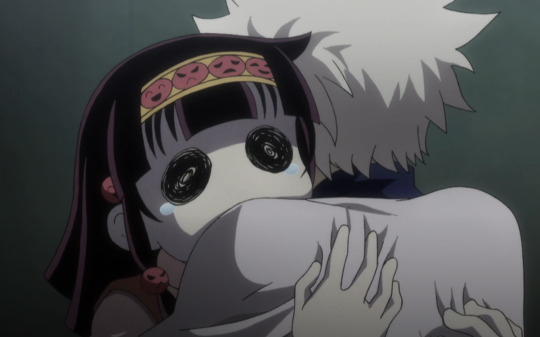
[ID: Two screenshots from episode 146. In the first, Nanika and Killua face each other, both of them teary. Nanika says "Kay." In the second, he has pulled her into a hug. Nanika is teary, her fingers gripping Killua's back tightly. End ID.]
...she doesn't even have to think about it.
I do think Killua still has a ways to go, but he is in a position right now to learn from his relationship with his sisters about balance - that love is not just selfless devotion, but also allowing those who love you to help you and make you happy too. I think that's what unconditional love is, in a way - supporting and working together with the people you love to make each other's wishes come true.
#oh my god this was supposed to be a brief write-up what happened 😭#ugh i feel like this is a bit of a mess and there's infinite other little points i could've made or elaborated on or interpreted differentl#but i'm so tired lmao#anyways tldr fuck you illumi you suck#killua is a snarky little shit but he also has so much love in his tiny body and i think we should appreciate him forever and ever#this also accidentally turned into alluka and nanika appreciation. i love them#nanika sweet angel i love you so much i hope you get all the head pats in the world#ghhh i'm so scared this doesn't make sense anymore i've been working on it for almost a week#hunter x hunter#hxh#hxh meta#killua zoldyck#call me ace detective the way i am ace. and also a detective.#storyrambles#also that one scene where gon turns to look directly at killua and tells him he has fun being with him makes me jdfhbvsdjfbvh#he's so intense about it i start laughing. no wonder killua basically just went ??!?!?!?! and like. leaned back because i think i would've#done the same lmaoooo#it's very sweet though :')#argh. gotta post. i need to stop hesitating. let's go.
224 notes
·
View notes
Text
In my opinion
There is no denying that House loves Cuddy. It's obvious, everybody knows it, there's no debate. Cuddy also loves House, again, obvious, no debate. But the way that Cuddy loves House is not the same as the way that Wilson does.
Cuddy acknowledges Houses issues, and she loves him in spite of them. She sees the worst parts of him, the "undesirable" parts of House, and she chooses to look beyond them. She sees the man that he is aside from those things, and she makes the conscious choice to coexist with those parts of him in exchange for being together with the parts that she loves. An example would be House's jealousy. She acknowledges that he can be extremely jealous, and she agrees to look past it because he's also very loving and protective. That's why when House continues to make mistakes, she becomes more and more disappointed. Because she sees a man who she believes could do better, falling back into his "old ways." She will try to convince herself that it's not a surprise when he does "bad" things, and she tries to convince herself that she doesn't need him to change, but the truth is that she does. Cuddy is a mother. She is a very mature, professional woman, and she wants to settle down. House, as he exists in the show, would not be able to live up to par with those expectations. I'm not saying he couldn't be a great dad to Rachel, or that he wouldn't love Cuddy, but he would realistically would not be able to act the way she needs and deserves for the rest of their lives. And when he does inevitably do something destructive, she will struggle to deal with it. Because she sees House as someone split down two sides, the "good" side, and the "bad" side, and she will expect him to focus on the "good" side, so when House does something wrong, it will feel like a personal attack, because she will see it as him not fighting hard enough to not give in to his "bad" side for her. And that's not to say anything bad about Cuddy, because the fact that she needs somebody who is the type of person that House just can not realistically be is neither of their faults. But I believe that House fully understands all of this. He is crumbling under the pressure of living up to Cuddy's expectations. He is constantly trying to fight his "bad" side so that he can be what she needs. But in reality, he is not two separate parts. There is no "good" and "bad" House. They are one in the same. With her, he has to fight to be what she needs. He has to fight to change. So when stressful things happen, his fight or flight response kicks in, and he runs. Because he's scared. He's scared that he is going to do something that will disappoint her. He is scared he won't live up to her expectations. With Cuddy, he has to sacrifice parts of himself to attempt to be who she needs. And it's just not sustainable. You can't live like that forever. All the good becomes overshadowed by constant anxiety and stress. It leads to House's mental health plummeting because he starts to hate himself for not being able to get rid of that "bad side." And so when Cuddy needs him during stressful times, he can't bring himself to be there for her fully, because he is so focused on the "good" side of him coming out, that he starts to lose himself.
With Wilson, however, it is basically the exact opposite. Wilson doesn't see two different sides of House. He sees one person who is incredibly multifaceted. He recognizes those "undesirable" parts of House, and he loves them just the same as he loves the "good" parts. Because he sees no divide. When House does things that are hurtful, he still calls him out, but he doesn't see it as a personal failure. He sees it as just a part of House. Like yeah, he'll insult your fatal illness, but he'll shoot some random guy with a spud gun for insulting you. Where as Cuddy would see those as two separate, distinct sides, Wilson sees those as a conjoined whole. He doesn't love House in spite of his issues. He loves House because of his issues. Because House's struggles are a part of what makes House who he is. So Wilson can fight with him and be mad at him and hurt him, but he doesn't expect House to throw away or "overcome" parts of himself. He would love for House to give up drugs, but he doesn't expect House to give up his addictive tendencies. There's a balance, and it's all an equal part of House. And so because of this, when House and Wilson are put in stressful situations, House doesn't feel like he has to run. He feels safe. Because he knows even if he says something wrong, and even if he upsets Wilson, Wilson is not going to leave him. Wilson does not have these high expectations for him that he feels like he is being forced to fill. And so he can focus on genuinely being in the moment and being there for Wilson because he is not fighting with himself, and he is not scared. He has trust in Wilson and enough trust in their relationship to know that they will work things out. I think the fact that they have very similar issues also helps a lot. He can be mean to Wilson and lash out, and Wilson will recognize that House is doing that because he is scared and because he loves him. In return, Wilson can also insult House and make fun of him because he's just as destructive. They meet each other on the same level because they are equals. House does not feel like Cuddy's equal. He feels like she is better than him, and he can't be himself with her. Him and Wilson know each other as well as they know themselves, and they're not constantly making the other feel like there are high expectations they have to fight to reach in order to love each other or be "worthy" of each other. They're just House and Wilson.
But I have no idea what I'm talking about, so take this with a grain of salt.
#(Yes Wilson does temporarily leave House but that's besides the point you get the jist)#I hope this makes sense because it took me forever to write it because my brain was struggling to put it into words#I feel like I've made similar posts before but whatever#Also I know people get pissed about the wall of text being to big and not having enough spaces in between paragraphs#but rip i guess because im not fixing it#house md#house#greg house#james wilson#gregory house#hilson#hate crimes md#hatecrimes md#housemd#wilson#favs#favourite#clearing out my drafts#house/wilson
301 notes
·
View notes
Text
anyway i think the overcomplication of queer labels has really done a disservice to younger (or newly discovered) queer folks trying to figure themselves out. you dont need to know every aspect and detail or your sexuality, gender, preference, etc. sometimes you just gotta let things happen and you’ll figure it out as you go. you may never have a word for it and that’s okay.
#radio rambles#world is your oyster n all that#to clarify when i say overcomplication i dont mean the fact that there are. so so many labels to pick from#i mean moreso that ppl are insistent on the rules and limits of those labels that you dont leave any wiggle room for experimentation#but there SHOULD be wiggle room. people are complicated#and i think the insistence ive seen so often on the ‘meaning’ of a label intimidates people out of trying#and. and. its okay to decide you dont want something#and dont like something#thats the point of trying it out#or even considering it#anyways. im keepinng it vague because i am talking about so many different aspects at once but#i hope this makes sense#ty pepper u are my buddy to ramble at#queer thoughts#<- talk tag ig. in case i wish to return
114 notes
·
View notes
Text
I tried but not very hard to see what the anniversary date was, and i decided to just prepare myself for the 16th or the 18th... it was the former. so, as always, but this time truly by accident... happy belated 17th birthday Black Butler!! I truly hope this year is amazing for us.
this year, I decided to use an idea I had wanted to try for a while but I never thought I would be able to pull off. and I still probably couldn't in the best way.... but regardless, here is a made up last chapter scenario.
you can also see this comic on webtoon here. whatever your fancy, if you please :>
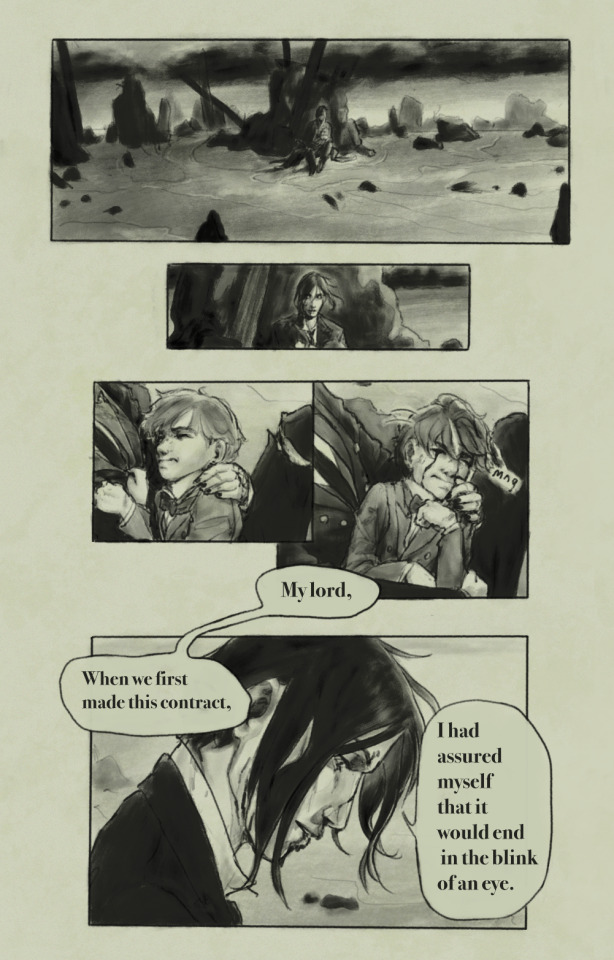
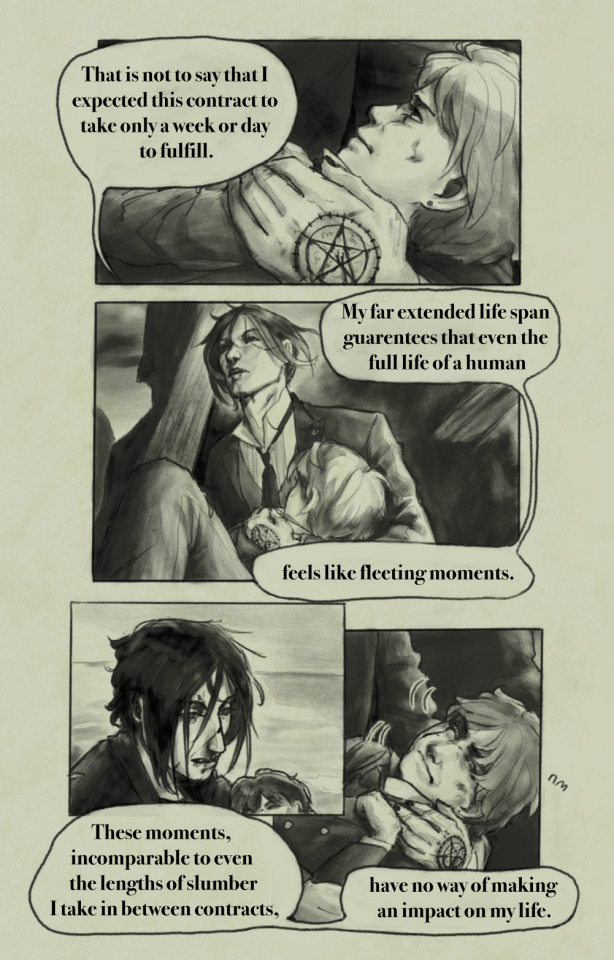
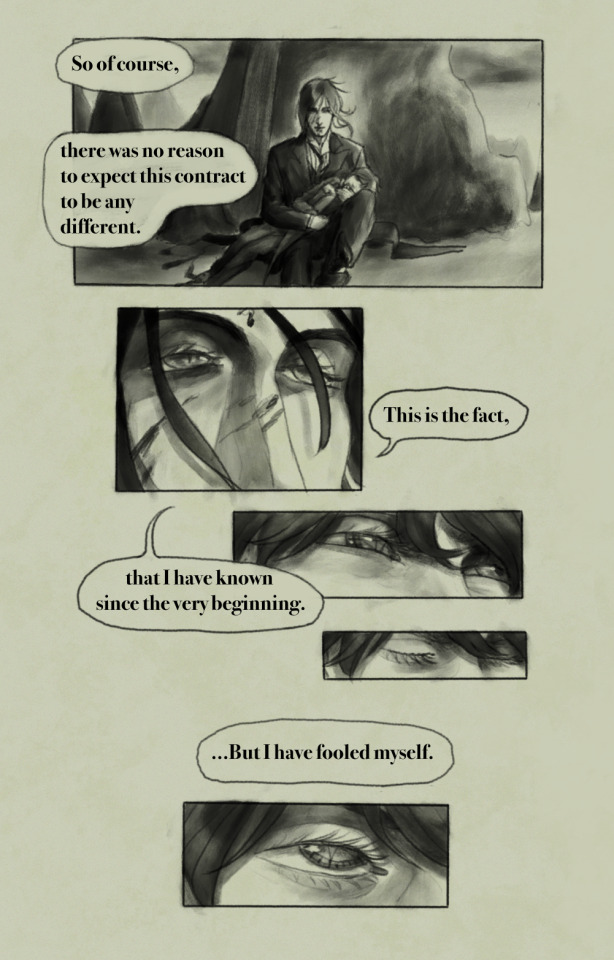
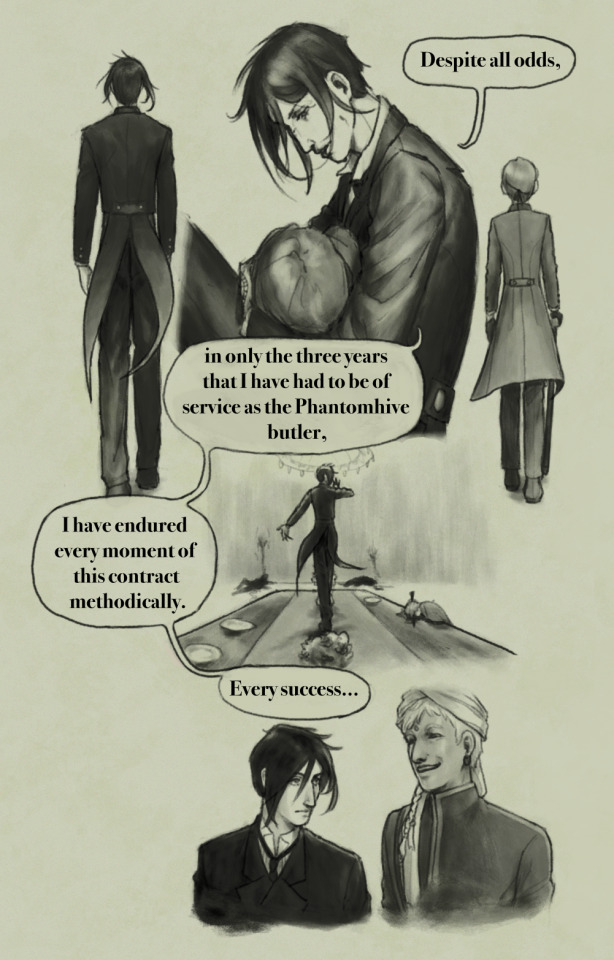
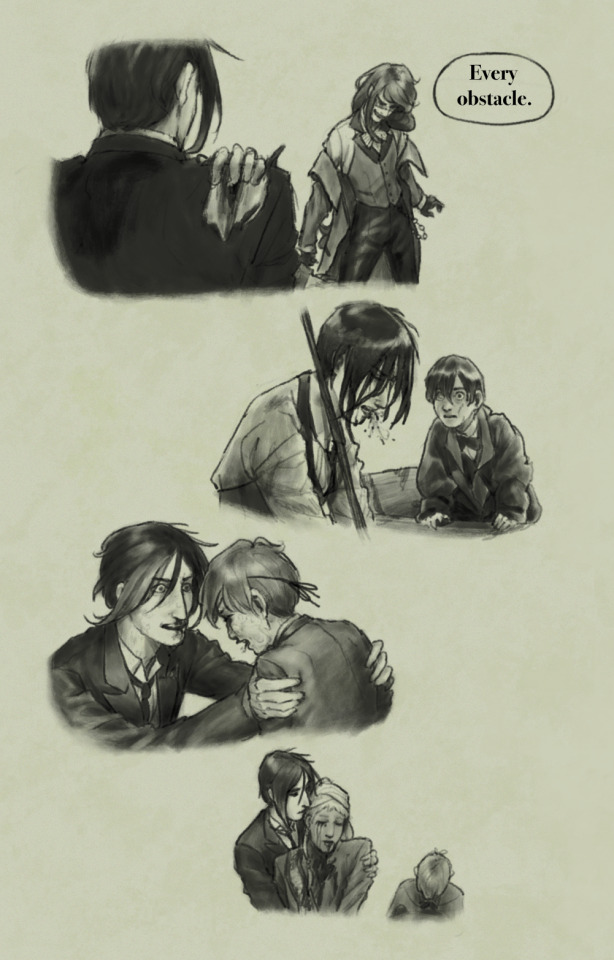
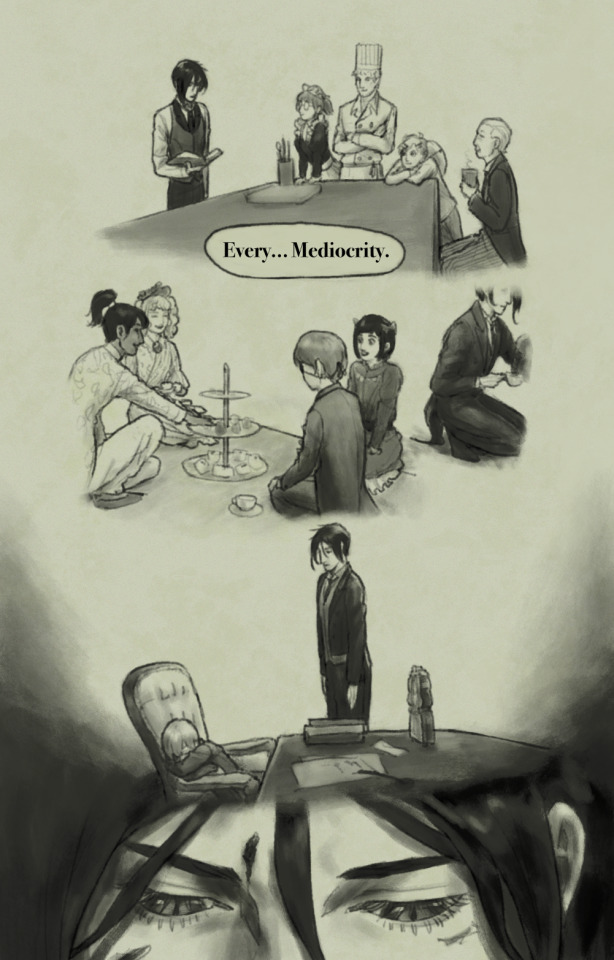
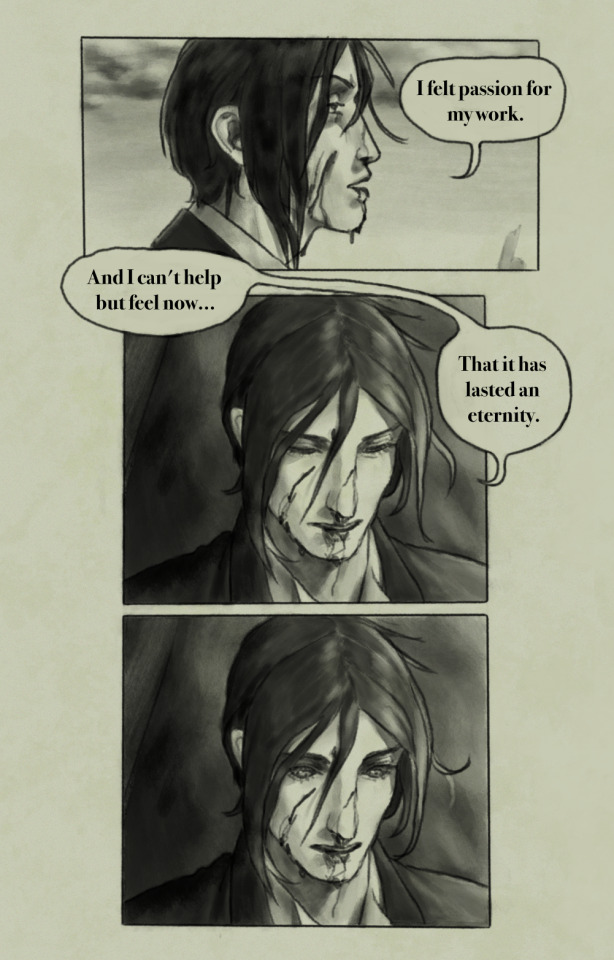
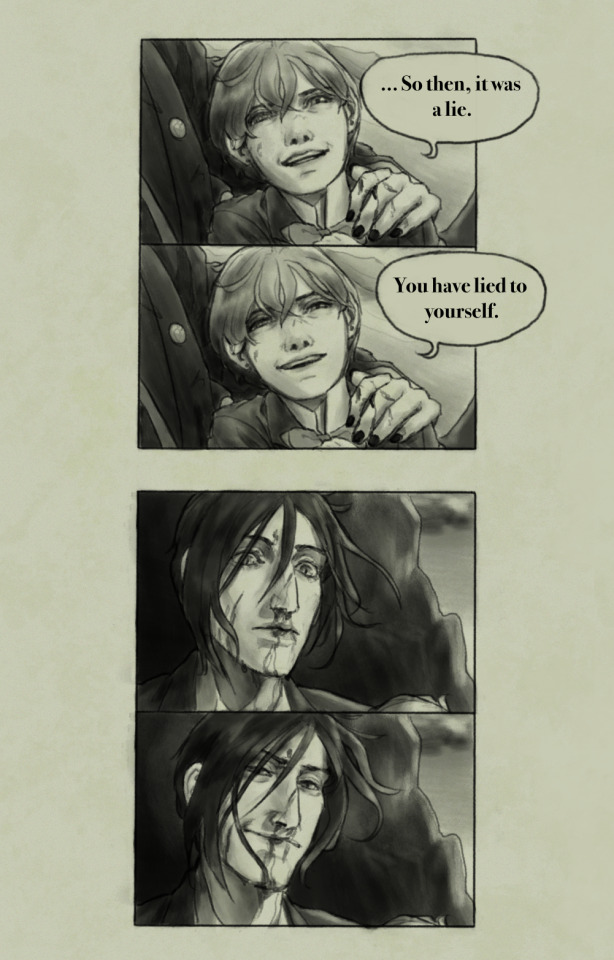
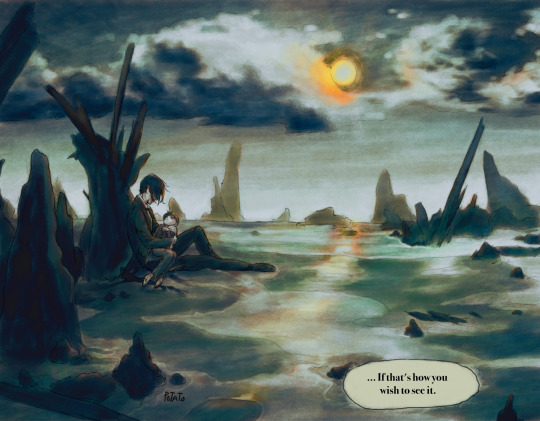
#I don't know if this thing makes any sense or if it means anything at all. or if it looks like anything actually carefully put together#but hey it was nice! so I hope it brings a little bit of pleasant feelings... or terrible ones idk#i was going a page a day fully intending to finish by the 13th the latest but yeaaa things came up. but whatever this is the last day that#I'm in america until some months later so it's still a special day for me! so it still counts. and also do specifics really matter so much#at this point#sadly while I wasn't rushed this time I did intend to use the remaining days i had to revise the visuals framing and diologue. so I'm not#100% confident. but c'est la vie#kuroshitsuji#black butler#kuroshitsuji fanart#fanart#sebastian michaelis#ciel phantomhive#digital art#and... I would be absolutely lying if I didn't try to put just a little bit of dadbastian undertones in there. it's what I do#but I think it's up for interpration. after I decided that I was gonna draw in my own style instead of trying to replicate yana's(as fun as#that would be) i decided to go crazy
749 notes
·
View notes
Text
A true and 100% historically accurate account of Hamilton's first meeting with Andre
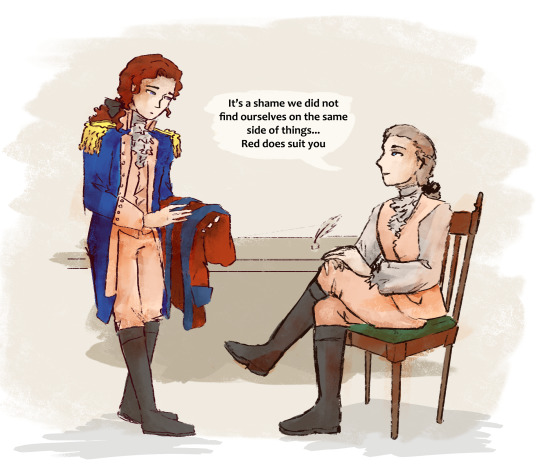
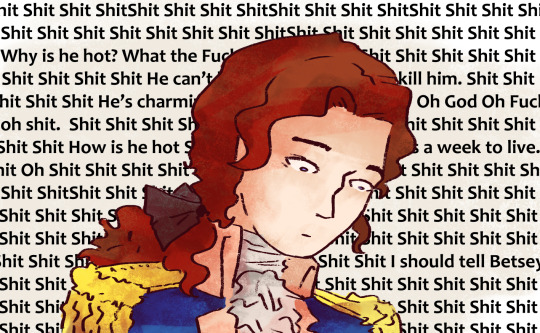
+ Bonus Lafayette
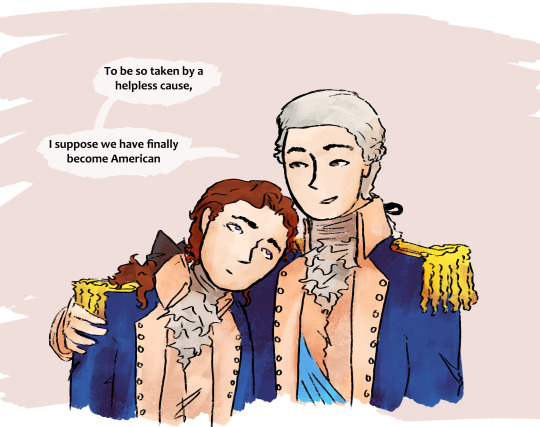
#No idea what my deal is this week#wahoo#alexander hamilton#john andre#amrev#art tag#now expand the post or these tags wont make sense#excuse me while I use these weird little sketches to vent some wildly complex feelings about American identity#theres something to be said about the way Lafayette and Hamilton express opposing views of humanity#in a way that is deeply connected to both how they view their “americanness”#and also the fact that only one of them was insanely fucking wealthy#theres cynicism born from poverty and a pervasive sense of otherness#vs a sort of naive hopefulness coming from wealth that isolated in an entirely different way#and they're brothers#I don't know what Im cooking but its something#marquis de lafayette#might as well tag him at this point#this was supposed to be a shitpost how did I get here
169 notes
·
View notes
Text
the really interesting thing about mortys fear of relying on rick is that it really does go both ways. like as much as hes afraid of needing rick... rick needs him just as much, if not more. and i think this ties into mortys fear of having to be responsible for ricks sadness.
there are SO many times where morty threatens to leave rick... just as rick constantly reminds morty that he can be replaced.
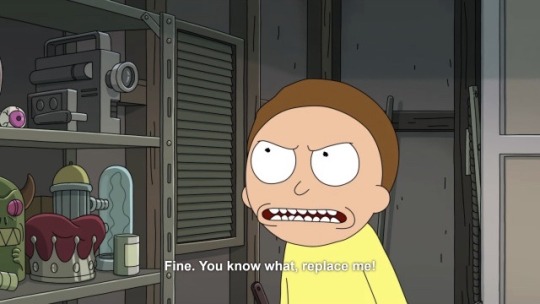
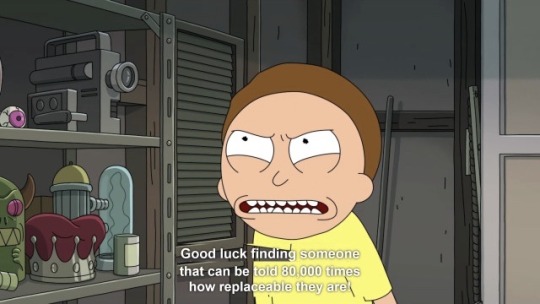
the difference is that morty COULD leave rick behind if he really wanted to. and he could probably be okay without him. but hell always come back to rick... because thats how hes meant to be. a mortys defining trait is how he will always put rick and his emotions first.
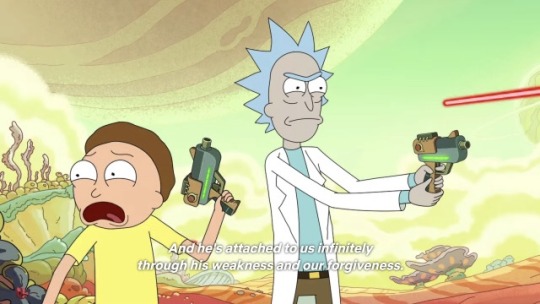
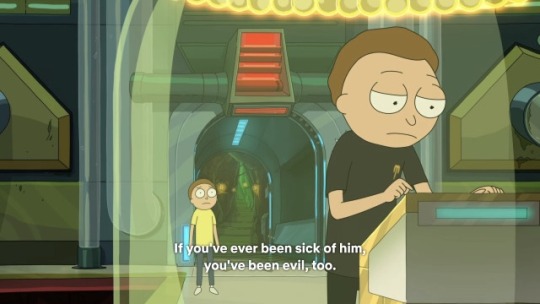
we can see this in evil morty and how he was able to escape the cycle simply by no longer caring about ricks feelings. what makes him different isnt being evil... its simply no longer prioritising the feelings of rick over his own.
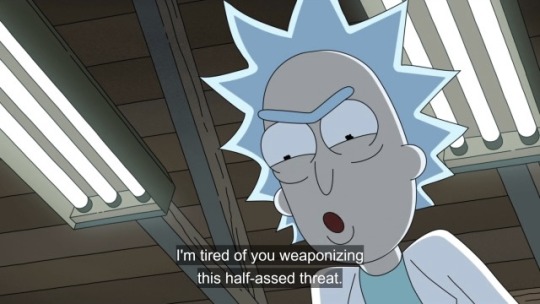
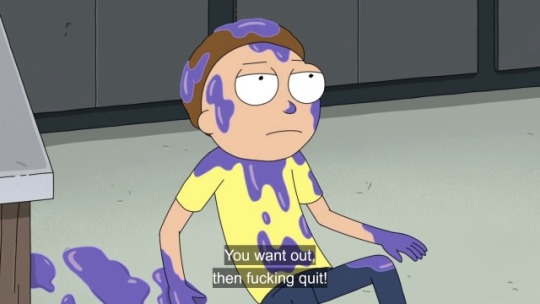
like how many times do we see morty choosing to stay with rick despite everything rick puts him through? and i think this is partly where his forgiveness comes from. of course he does truly love rick and that plays into it, but hes also terrified of what might happen without him there to fall back on.
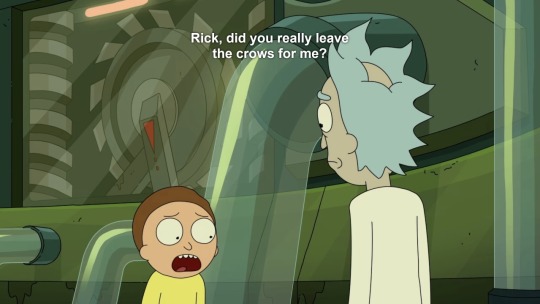
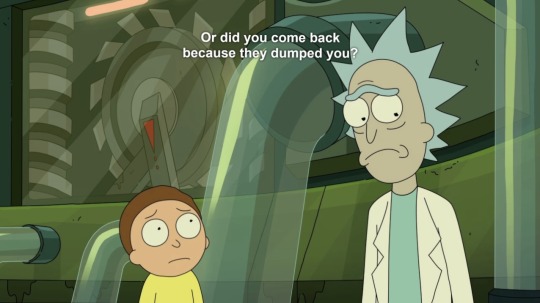
any time rick feels he might lose morty he spirals and lashes out in some weird manipulative way to keep morty reliant on him (which is ironically the very thing morty fears most).
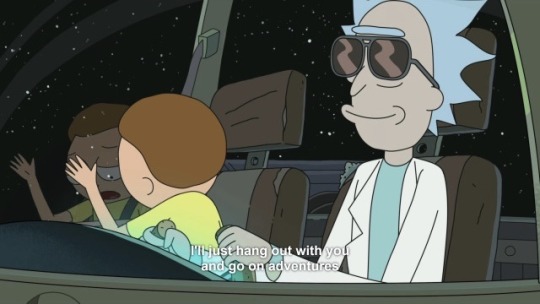
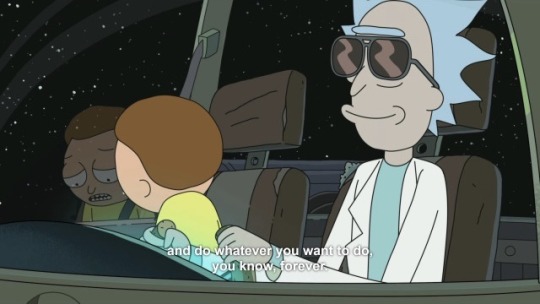
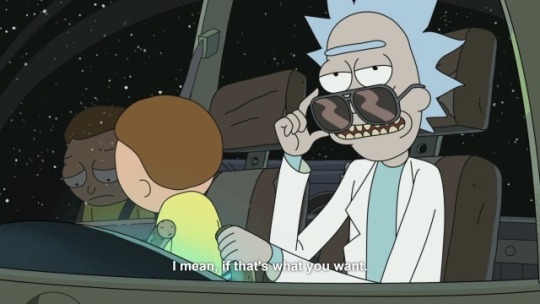
and whenever he DOES lose morty for any amount of time he turns into a complete wreck. probably part of the fear of his own reliance on rick comes from knowing its largely manufactured by rick and not fully his own choice.
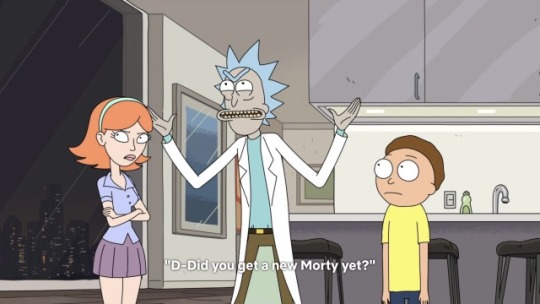
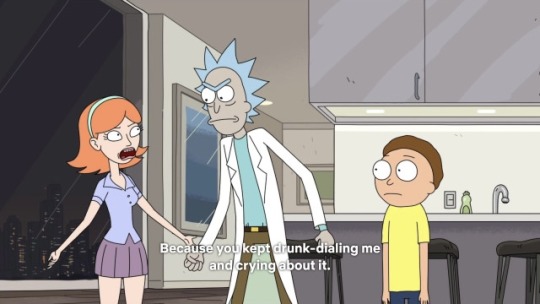
even WITH morty there to support him rick is incredibly prone to suicidal ideation and self destructive tendencies. its not hard to work out what would happen if morty was no longer around to cater to his emotions.
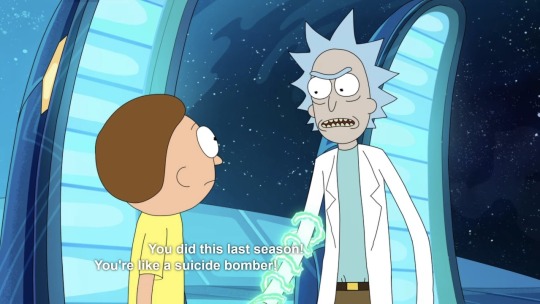
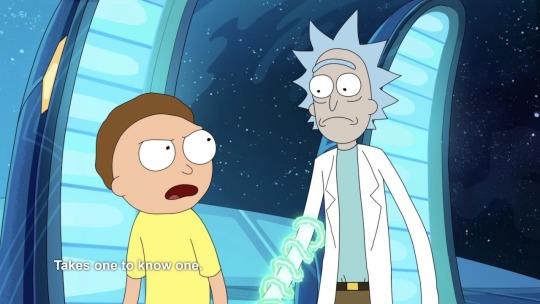
so he stays. of course its awful for him. but he does it. hes willing to sacrifice himself and his own emotions to save rick over and over again. because he knows what will happen if he doesnt.
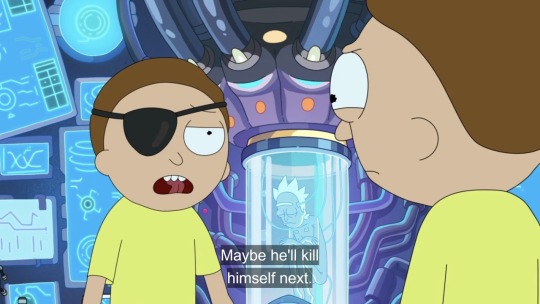
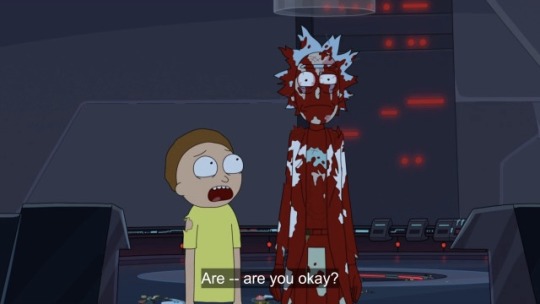
#rick and morty#rnm spoilers#I HOPE TO GOD THIS MAKES SENSE. i had to rewrite it like 3 times#i feel like this kinda loses the point halfway thru but oouuguughhh. being responisble for ricks sadness. its all so paifnully real#hopefully the screenshots make sense too LOLLL#i have soooooo many thouhts abt this ep. i just wanted to get this thing out specifically#its hard to organise my thoughts properlyyyy like this but its hit me like crazy
393 notes
·
View notes
Text
submitting my paper tonight and then I'm off for a week, so:
for every like on this post I'll add 5 words to my WIP. 10 for every reblog. count stops when I return on Saturday next week.
#litchi.txt#the wip in question is a dh fic#its for my corvosider spirit au#depending on how many notes I get on this uhhh#I will stop counting once the fic is finished#I am guesstimating 50k words for the whole thing and Im at like 15k at this point#so in case we overdo it past the 'this fic is completely finished and done with for good' limit Im ditching ur words sorry#yeah#idk if this makes sense but i hope u get what i mean#word count#(<- tag for me to find this later)#(i feel like this might get 3 likes and a reblog)
188 notes
·
View notes
Note
Hi, i just learned about the scientific revolution in europe at school. Can you tell me why you dont think scientific revolutions exist? im curious!
So I feel like I have to lead with the fact that I'm kind of arguing two different points when I say scientific revolutions aren't really a thing
One is that I'm objecting to a specific, extremely foundational theory of scientific revolutions that was put forth by the philosopher Thomas Kuhn, which I think really misrepresents how science is actually practiced in the name of fitting things to a nice model. The other is that I think the fundamental problem with the idea is that it's too vague to effectively describe an actual process that happens.
It's certainly true that there are important advances in science that get referred to as "revolutions" that fundamentally changed their fields -- the shift from the Ptolemaic model of the Solar System to the Copernican one, Darwin's theory of evolution, etc. But there are historians of science (who I tend to agree with) that feel that terming these advances "revolutions" ignores the fact that science is an continuous, accretional process, and somewhat sensationalizes the process of scientific change in the name of celebrating particular scientists or theories over others.
Kuhn's model that he put forth in The Structure of Scientific Revolutions (which is one of those books that itself stirred a great deal of activity in a number of fields) suggests science evolves via what he called "paradigm shifts," where new ideas become fundamentally incompatible with the old model or way of doing things, causing a total overturn in the way scientists see the world, and establishing a new paradigm -- which will eventually cave to another when it, too, ceases to function effectively as a model. This theory became extraordinarily popular when it was published, but it's somewhat telling who it's remained popular with. Economists, political scientists, and literary theorists still use Kuhn, but historians of science, in my experience at least, see his work as historically significant but incompatible with how history is actually studied.
Kuhn posits that between paradigm shifts there are periods of "normal science" where paradigms are unquestioned and anomalies in the current model are largely ignored, until they reach a critical mass and cause a scientific revolution. In reality though, there is often real discussion of those anomalies, and I think the scientific process is not nearly so content to ignore them as Kuhn thinks. Throughout history, we see people expressing a real discontent with unsolved mysteries the current scientific model fails to explain, and glossing over those simply because the individuals in question didn't manage to formulate breakthrough theories to "solve" those problems props up the somewhat infamous "great men" model of history of science, where we focus only on the most famous people in the field as significant instead of acknowledging that science is a social enterprise and no research happens in a vacuum!
Beyond disagreeing with Kuhn specifically though, I think the idea of scientific revolutions vastly simplifies how science evolves and changes, and is ultimately a really ahistorical way of thinking about shifts in thinking. Take the example of the shift from Ptolemaic, geocentric thought to the heliocentric Copernican model of the solar system. When does this supposed "revolution" in thought actually start, and when does it "end" by becoming firmly established? You could argue that the publication of Copernicus' De revolutionibus orbium coelestium in 1543 was the beginning of the shift in thinking -- but of course, then you have the problem of asking where Copernicus' ideas came from in the first place.
The "great men" model of history would suggest Copernicus was a uniquely talented individual who managed to suggest something no one else had ever put forth, but realistically, he was influenced by the scientists who came before him, just like anyone else. There were real objections to the Ptolemaic model during the medieval era! One of the most famous problems in medieval astronomy was the fact that assuming a geocentric model makes the behavior of the planets seem really weird to an observer on Earth, referred to as retrograde motion, which had to be solved with a complicated system of epicycles that people knew wasn't quite working, even if they weren't able to put together exactly why. There were even ancient Greek astronomers who suggested that the sun was at the center of the solar system, going all the way back to Aristarchus of Samos who lived from around 310-230 BCE!
Putting an end point to the Copernican revolution poses similar challenges. Some people opt to suggest that what Copernicus started, either Galileo or Newton finished (which in and of itself means the "revolution" lasted around 100-150 years), but are we defining the shift in terms of new theories, or the consensus of the scientific community? The latter is much harder to pinpoint, and in my opinion as an aspiring historian of science, also much more important. Again, science doesn't happen in a vacuum. Copernicus, Galileo, and Newton may be more famous than their peers, but that doesn't mean the rest of the Renaissance scientific community didn't matter.
Ultimately it's a matter of simple models like Kuhn's (or other definitions of scientific revolutions) being insufficient to explain the complexity of history. Both because science is a complex endeavor, and because it isn't independent from the rest of history. Sure, it's genuinely amazing to consider that Copernicus' De revolutionibus orbium coelestium and the anatomist Andreas Vesalius' similarly influential De humani corporis fabrica were published the same year, and it says something about the intellectual climate of the time. But does it say something about science only, or is it also worth remembering that the introduction of typographic printing a century prior drastically changed how scientists communicated and whose ideas stuck and were remembered? On a similar note, we credit Darwin with suggesting the theory of evolution (and I could write a similarly long response just on the many, many influences in geology and biology both that went into his formulation of said theory), but what does it say that Alfred Russel Wallace independently came up with the theory of natural selection around the same time? Is it sheer coincidence, or does it have more to do with conversations that were already happening in the scientific community both men belonged to that predated the publication of the Origin?
I think that the concept of scientific revolutions is an important part of the history of the history of science, and has its place when talking about how we conceive of certain periods of history. But I'm a skeptic of it being a particularly accurate model, largely on the grounds of objecting to the "great men" model of history and the idea that shifts in thinking can be boiled down to a few important names and dates.
There's a famous Isaac Newton quote (which, fittingly, did not originate with Newton himself, but can be traced back even further to several medieval thinkers) in which he states "If I have seen further it is by standing on the shoulders of Giants." I would argue that science, as an endeavor, is far more like standing on the shoulder of several hundred thousand other people in a trenchcoat. This social element of research is exactly why it's so hard to pull apart any one particular revolution, even when fairly revolutionary theories change the direction of the research that's happening. Ideas belong to a long evolutionary chain, and even if it occasionally goes through periods of punctuated equilibrium, dividing that history into periods of revolution and stagnancy ignores the rich scientific tradition of the "in-between" periods, and the contributions of scientists who never became famous for their work.
#SORRY FOR WRITING A NOVEL#i hope this makes sense and that i am not too deep in the history of science theory to give a good explanation#a much shorter tl;dr answer would be that my stance towards scientific revolutions is more skepticism than total rejection#but hyperbole gets the job done a lot faster haha#getting to the point that i really should have a#history of science tag
365 notes
·
View notes
Note
Each time you draw Daigo or Masato in a corset I gain 500 HP thank you
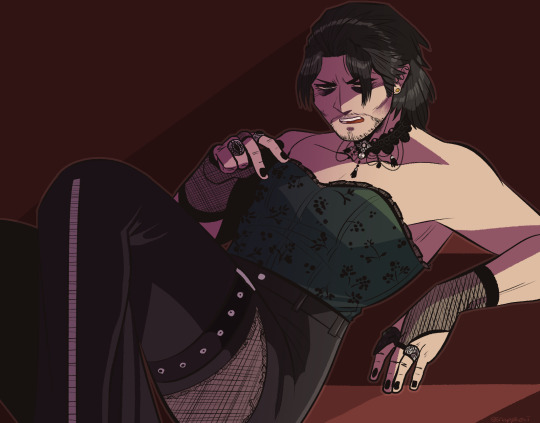
do you accept corset tops. may you live a thousand years
#rgg#ryu ga gotoku#ryu ga gotoku 7#yakuza series#yakuza 7#yakuza like a dragon#masato arakawa#snap sketches#hello friend .... i wanted to draw masato in this top at some point so im glad ive been given the excuse to now JAWLKJWA#i enjoy putting men in corsets if only cause i just really wanna share whats in my closet#this is one of my fave tops tbh .... its really hard finding tops this color in styles i like#i dont want my closet to JUST be black actually. sometimes we can have a dark red or brown. emerald auspiciously#one time i found a really nice green top but my arms were too big for it and there was no other sizes- like everything else fit But My Arms#how does that even make sense. hate it here but we carry on#this wasnt what i wanted to draw this weekend but when will i ever compalin about drawin masato. never thats what#i still have my silly doodles planned for this weekend so i hope those turn out well#for now im sleeby BYYYYEEE thank you anon for supporting me adn my work :]]]]]]]]]
106 notes
·
View notes